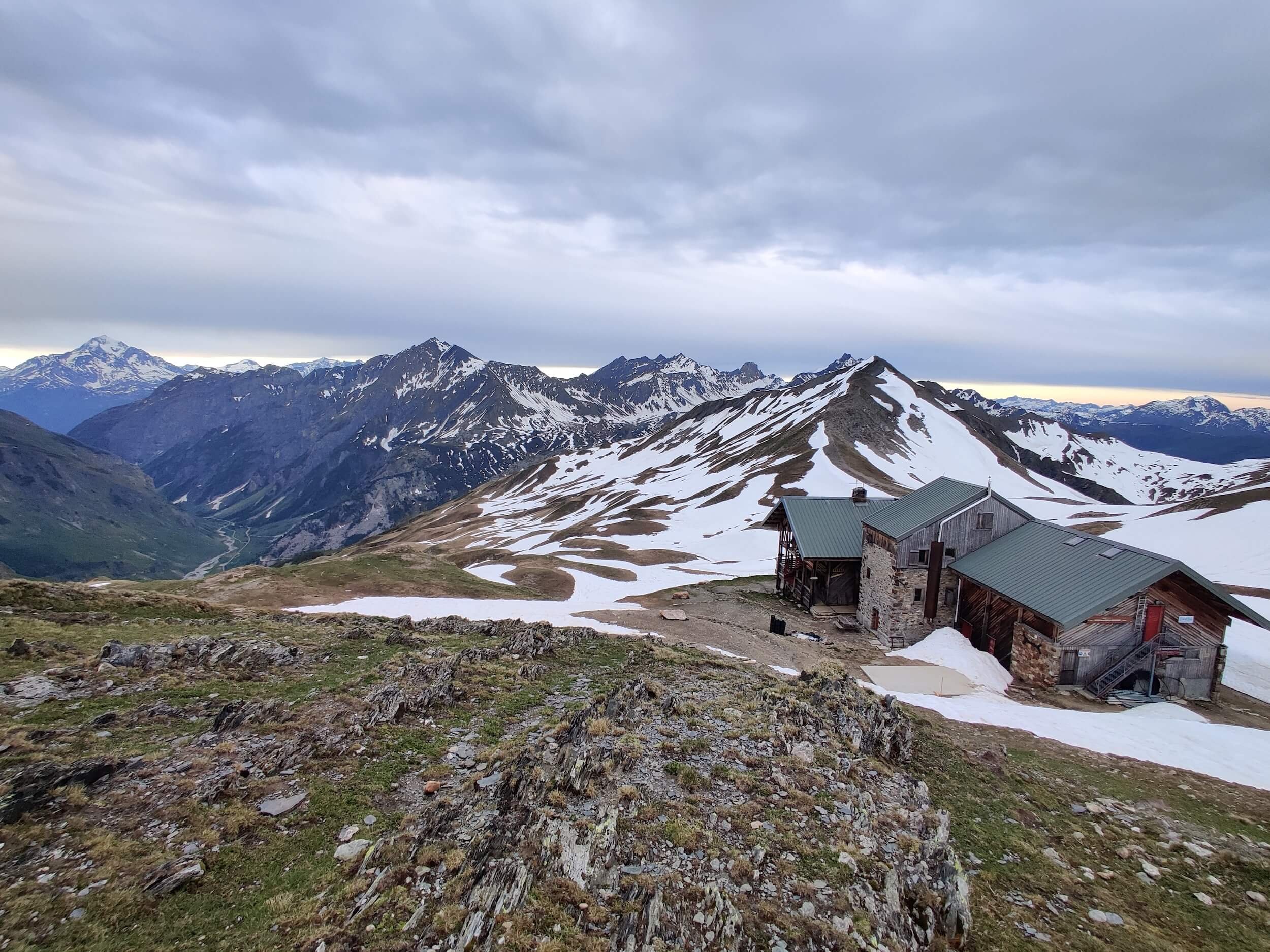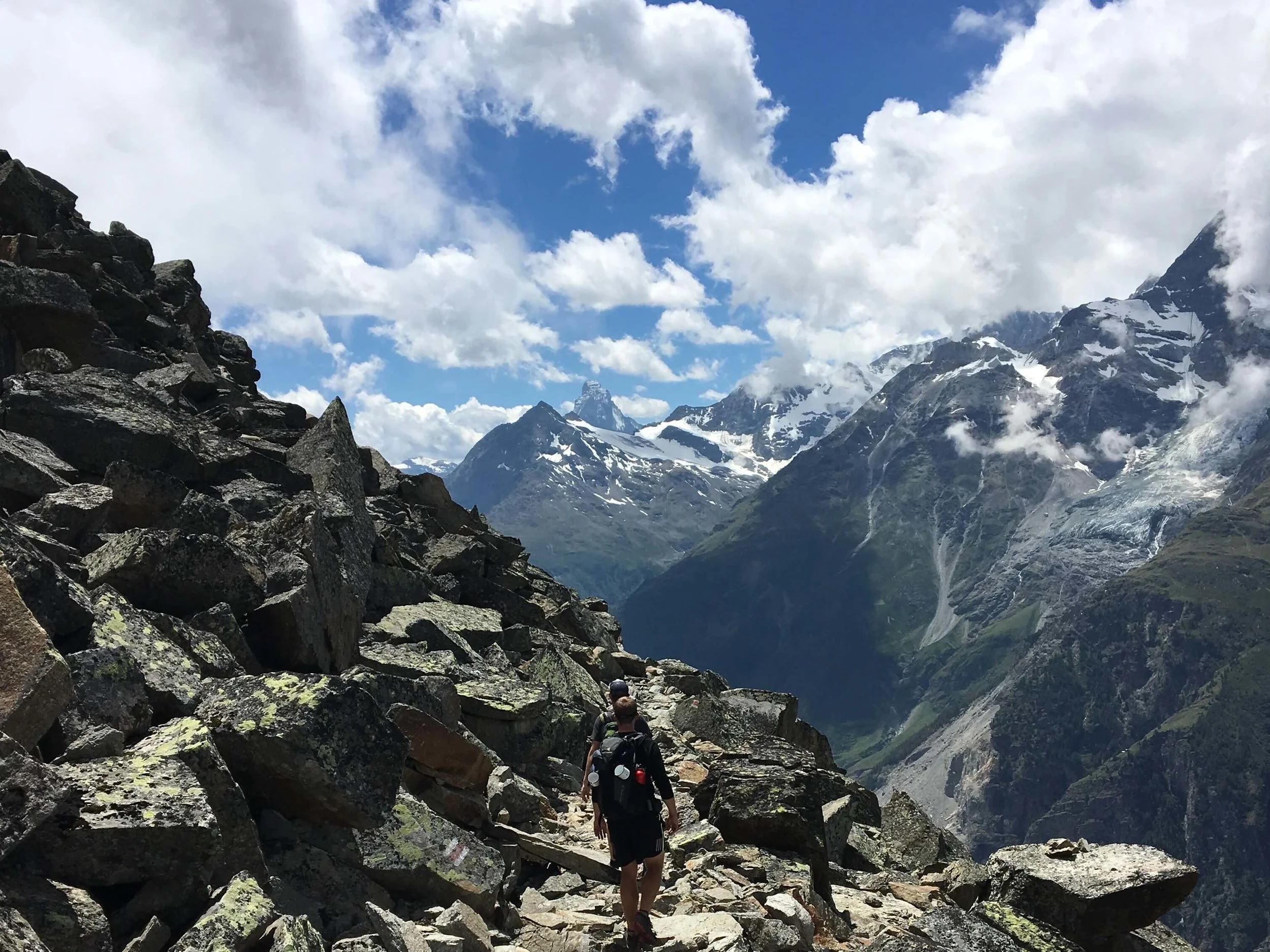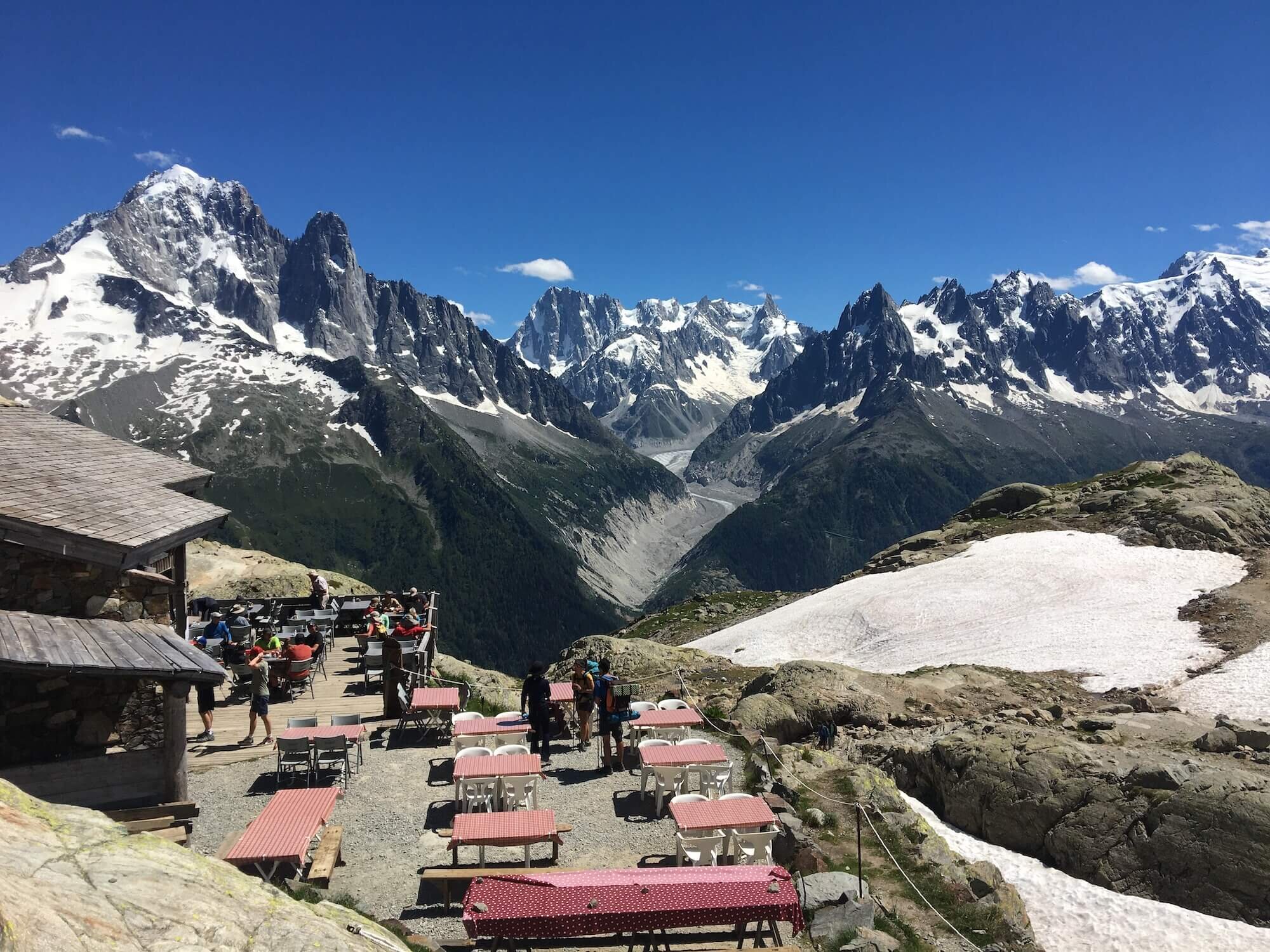If you're searching for an unforgettable trekking experience in the Alps, look no further than the Tour des Combins. This spectacular multi-day hike loops around the majestic Grand Combin massif, offering breathtaking landscapes, challenging trails, and a deep immersion into alpine beauty.
Real-time accommodation availability in our app
Updated 6th March 2025 for new properties.
As part of our acquisition of TMB Planner, we’ve integrated technology into our app to check bed availability for mountain huts. At time of launch, we focused on incorporating the existing TMB Planner accommodation scope for the Tour du Mont Blanc trail, however, we’ve now extended the same technology to other popular trails where accommodation is challenging for DIY planners to find, such as Alta Via 1 in the Dolomites and the newest trail, the West Highland Way in Scotland.
What type of accommodation can we provide availability data for?
The scope of mountain huts is limited to those which list their availability online. We can not provide availability data for mountain huts that do not list their availability online, for example, those properties requiring bookings to be made via phone, email, or submitting an online form.
In our accommodation database, we also have many more accommodation types along the trail, such as hotels, campgrounds and bivouac locations. Where an accommodation location lists their availability online, such as hotels, we plan to integrate this information into our app over the next year.
what type of accommodation can’t we provide availability data for?
If the accommodation location is one of the following, there is no availability data that we can provide you;
Bivouac or wild camping locations
Campgrounds that don’t accept/need bookings
Accommodation that don’t list their availability online
A general accommodation location rather than being for a specific property
The following Tour du Mont Blanc properties are now live. From March 7th 2025, you will also be able to see real-time availability and set alerts for the following properties on our other trails. More are planned to be added by the end of March!
-
Chalet Les Meandres (ex Tupilak)
Gite Michel Fagot
Refuge du Fioux
Auberge du Truc
Chalet CAF des Contamines
La Ferme a Piron
Gite Les Melezes
Gite le Pontet
Refuge Nant Borrant
Refuge des Pres
Refuge de la Balme
Refuge de la Croix du Bonhomme
Refuge de la Nova
Les Chambres du Soleil
Refuge des Mottets
Robert Blanc
Cabane Combal
Rifugio Monte Bianco
Rifugio Maison Vieille
Gite le Randonneur du Mont Blanc
Rifugio Bertone
Hotel Funivia
Hotel Lavachey
Hotel Chalet Val Ferret
Gite Alpage de La Peule
Hotel du Col de Fenetre
Gite de La Lechere
Chalet Le Dolent
Auberge de Maya-Joie
Auberge des Glaciers
Gite de la Fouly
Hotel Edelweiss La Fouly
Pension en Plein Air
Gite Bon Abri
Chalet La Grange
Relais d'Arpette
Hotel Col de la Forclaz
Auberge la Grande Ourse
Auberge du Mont-Blanc
Refuge Le Peuty
Refuge du Col de Balme
Gite Mermoud
Gite d'Alpage Les Ecuries de Charamillon
Albert Premier Hut
Chalet CAF du Tour
Gite Le Moulin
Auberge la Boerne
Refuge Lac Blanc
Plus some properties in the villages
-
Refuge Lac Blanc
Auberge la Boerne
Gite Le Moulin
Chalet CAF du Tour
Gite d'Alpage Les Ecuries de Charamillon
Gite Mermoud
Albert Premier Hut
Refuge du Col de Balme
Refuge Le Peuty
Auberge du Mont-Blanc
Auberge la Grande Ourse
Hotel Col de la Forclaz
Relais d'Arpette
Gite Bon Abri
Chalet La Grange
Pension en Plein Air
Cabane de Mille
Cabane Brunet
Cabane FXB Panossiere
Cabane de Louvie
Cabane de Prafleuri
Cabane de la Barmaz
Cabane des Dix
Cabane de Moiry
Turtmannhutte
Topalihutte
Taschhutte
-
Rifugio Biella
Rifugio Scotoni
Rifugio Lagazuoi
Rifugio Col Gallina
Rifugio Scoiattoli
Rifugio Averau
Rifugio Nuvolau
Rifugio Croda da Lago
Rifugio Passo Staulanza
Rifugio Adolfo Sonino Al Coldai
Rifugio Attilio Tissi
Rifugio Mario Vazzoler
Rifugio Bruto Carestiato
Rifugio Passo Duran
Rifugio Fanes
Rifugio Lavarella
Rifugio Fodara Vedla
Rifugio Pederu
Plus some additional properties in villages
-
Ashbank B&B
Braeside Guest House
Shandon Farmhouse
Inversnaid Bunkhouse
Inversnaid Hotel
Ardess Lodge & Ben Lomond Bunkhouse
-
Brochhuette SAC
Berghaus Alpiglen
Rotstockhuette
Gspaltenhornhuette SAC
Bluemlisalphuette SAC
Winteregghuette SAC
-
Cabane de Mille
Cabane Brunet
Cabane de Louvie
Cabane FXB Panossiere
Cabane de Chanrion
Rifugio Champillon
Rifugio Frassati
Mont-Joux Auberge
Great St. Bernard hospice
Hotel du Col de Fenetre
Gite de La Lechere
Chalet Le Dolent
Auberge de Maya-Joie
Gite de la Fouly
Auberge des Glaciers
Hotel Edelweiss La Fouly
La Tsissette Hut
Pension en Plein Air
-
Britannia Hut
Albergo Ristoro Sitten
Topalihutte
Taschhutte
-
Rifugio Puez (CAI)
How to get to/from the Tour des Combins trail
Introducing Jonas de Jong, trail expert for Tour des Combins
We are excited to share that Jonas de Jong has joined The Hiking Club team as “Trail Expert, Tour des Combins”.
Originally from the Netherlands, Jonas moved to Switzerland in 2016 and his love for the mountains blossomed. He’s hiked and run through forests, hills, and mountains, completing multi-day tours like the Tour du Mont Blanc, Tour des Combins and Tour du Monte Rosa. Jonas has also ventured into high-altitude mountaineering, having conquered over 10 of the Alps' 4,000-meter peaks. In trail running, he’s become one of the fastest from his low-altitude homeland, participating in races like Sierre-Zinal and OCC of the famed UTMB circuit.
Jonas is training to become an International Mountain Leader and has become an expert in the Pennine Alps region. He has experience during all seasons - summer, winter and shoulder - and offers guiding services for those that are interested in tackling more technical routes or to support a private group. He has guided groups all across the alps and beyond in hiking, trail running and snowshoeing.
As the “Trail Expert, Tour des Combins”, Jonas will be the key point person on The Hiking Club team for this trail. Our planning app will not only include necessary data and information for hiking the main trail, but also the inclusion of alternative routes and highlights that provide a unique experience. He will also provide consulting services via our Expert Access and Expert Consultation packages, present workshops and webinars, answer customer support questions and lead marketing activities.
With Jonas’ expertise, we aim to bring the most comprehensive planning tool for the Tour des Combins to The Hiking Club community.
Where to park my car when hiking the Tour des Combins
If you’re planning to drive to the Tour des Combins with either your own or a rental car, parking can be an important consideration, as the trail spans both Switzerland and Italy, passing through several towns and remote areas. Here’s a breakdown of parking options for hikers embarking on the Tour des Combins, covering key starting points and access points for the trail.
When is the best time to hike the Tour des Combins
The best time to hike the Tour des Combins is typically from late June to early September, when the weather is most favorable, the trail is clear of snow, and mountain huts are open. The choice between early or late summer depends on your preferences for weather and crowds, but both options offer stunning alpine landscapes and a challenging yet rewarding experience. Read our detailed blog to learn more about when is the best time to hike the Tour des Combins.
Break the trail 2022
As the days get longer and the weather starts to warm up in the Alps, I’m excited to share the draft plan I’ve come up with for my first adventure this hiking season. The 10 day journey through the Pennine Alps has been designed to spend time on the Tour du Mont Blanc, Walker’s Haute Route, Tour of Monte Rosa, Hidden Paradise Tour, and Tour des Combins.
My proposed route comes in at just over 270 km / 169 mi with an intimidating 20,400 m / 67,000 ft of elevation gain. In this blog, I will share details about my proposed route, preparation, and goal for the hike.
The Pennine Alps
The Pennine Alps are a towering mountain range marking the border between the canton of Valais in Switzerland and the Italian provinces of Piedmont and the Aosta Valley. They are located in the western part of the Alps, with the Mont Blanc massif flanking them to the West and Lepontine Alps to the East. With over thirty 4,000m / 13,000ft + peaks including the famous Matterhorn and Monte Rosa, a trail through the Pennine Alps features on the bucket list of most hikers.
Pennine Alps: Shaded in blue
The availability of mountain accommodation and transportation has created many incredible day and overnight hiking experiences in the Pennine Alps. The top 5 multi-day experiences in this area are:
Walker’s Haute Route (~ 213km / 132mi): along the North side
Alta Via 1 - Aosta Valley (~ 190km / 118mi) : along the South side
Tour of Monte Rosa (164km / 102mi): around the East end
Tour des Combins (100km / 62mi): around the West end
Tour of the Matterhorn (107km / 66mi): around the middle section
Experienced mountaineers also have the original ‘Haute Route’ which follows the Pennine Alps mountain chain, spending much of its time on glaciated terrain. This route was first forged by the English Alpine Club in the mid-19th century and has become a popular ski route in the Spring months too.
The rugged high mountain terrain of the Pennine Alps offers few opportunities for easy passage between Switzerland and Italy. For hikers, only four trails become snow-free in the summer and a further two remain glaciated year-round (but can be crossed with a guide). Col du Grand Saint Bernard on the West end and Simplon pass on the East offer the easiest places to cross the Pennine Alps and have been used by travelers as far back as the Bronze Age — about 800 B.C. Nowadays, roads have been built over these two passes and you’ll often hear the roar of sports cars enjoying the high mountain switchbacks.
Aside from the big mountain vistas, some of the unique highlights in the area include seeing the Valais Blackneck goat, the origin of raclette and fontina cheeses (which are a culinary highlight in their own right!); the tallest gravity dam in the world (Grande Dixence); the highest peak in Switzerland (Monte Rosa); and longest pedestrian suspension bridge in the alps (Charles Kuonen suspension bridge).
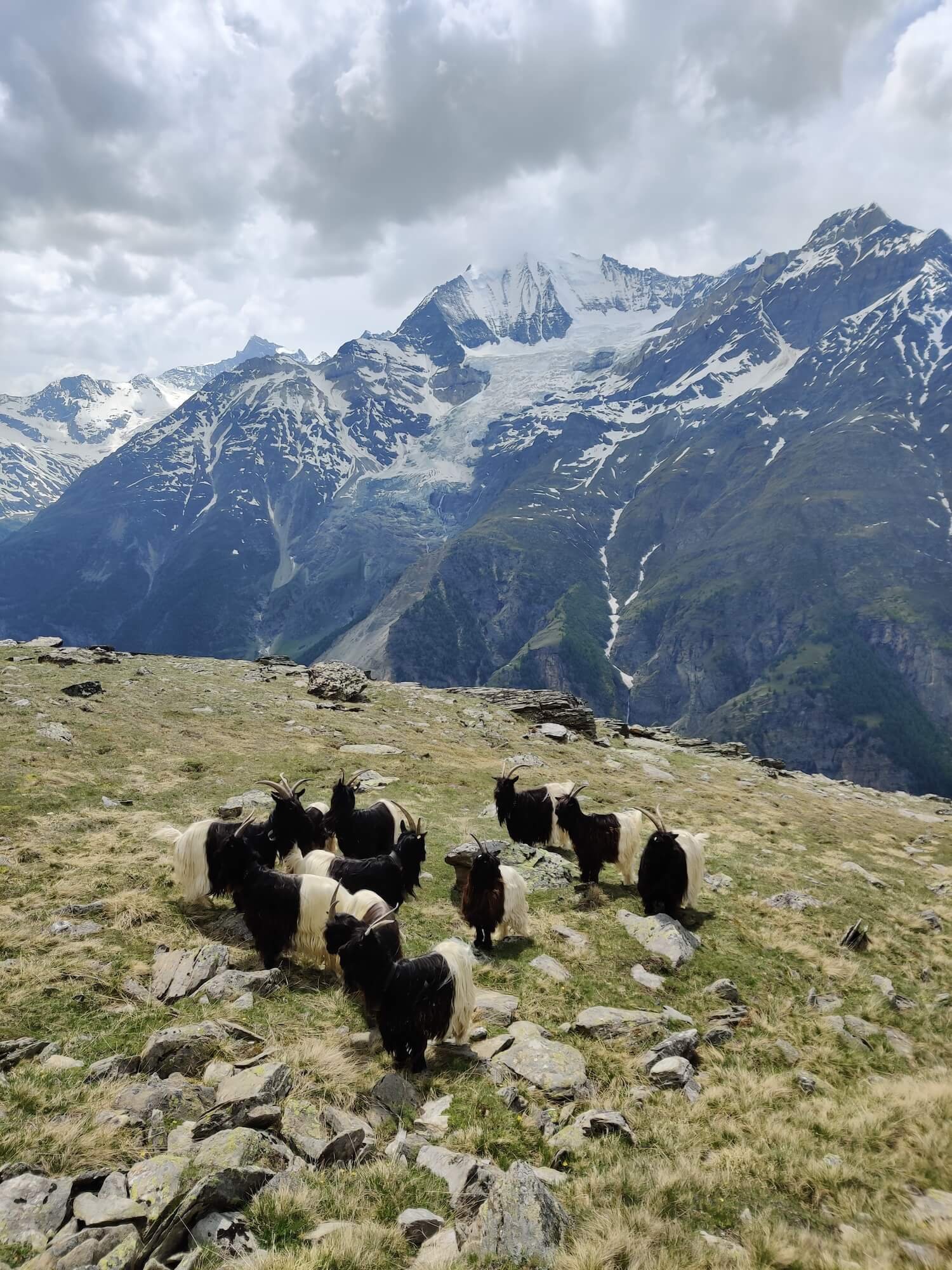

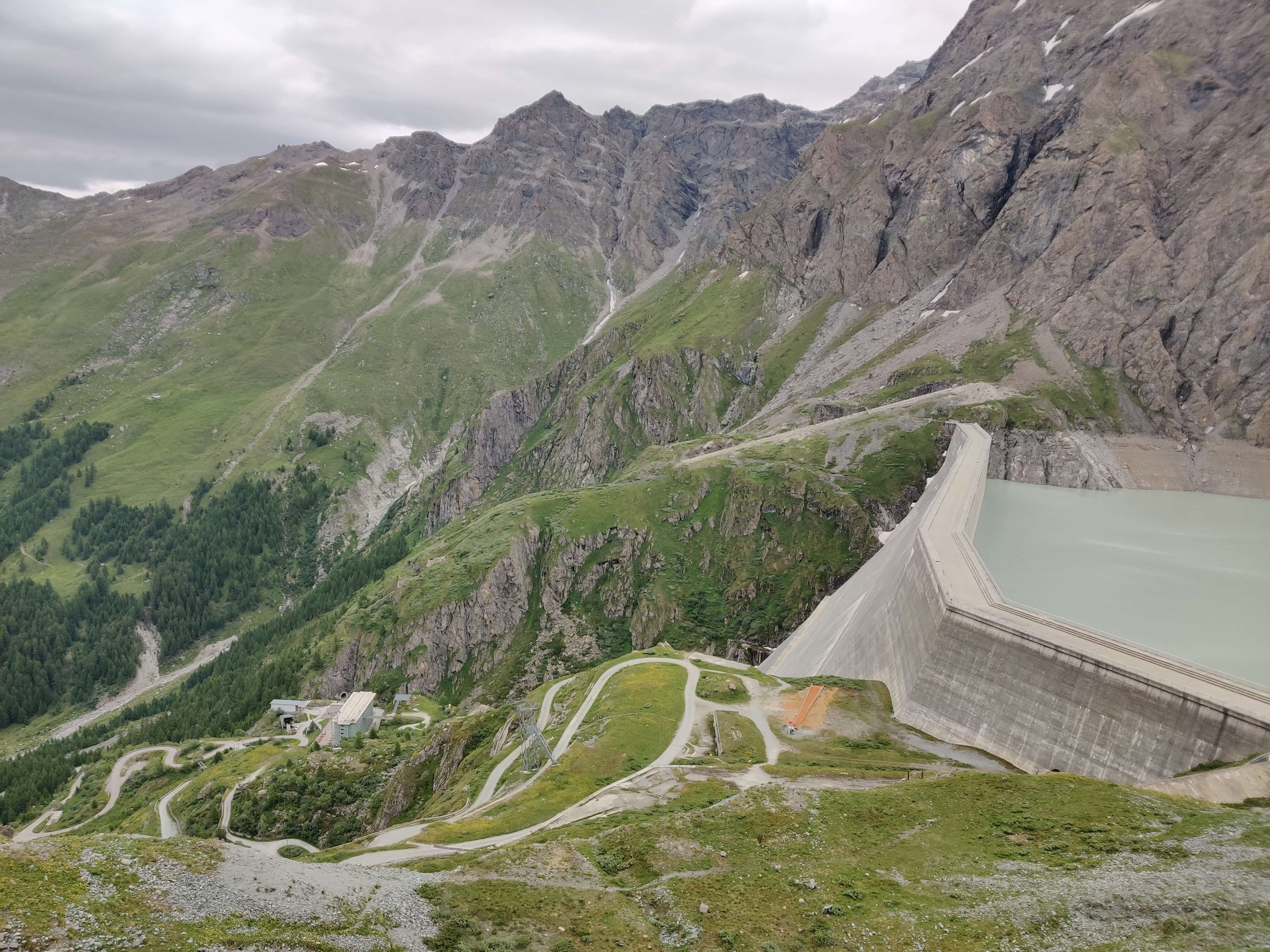
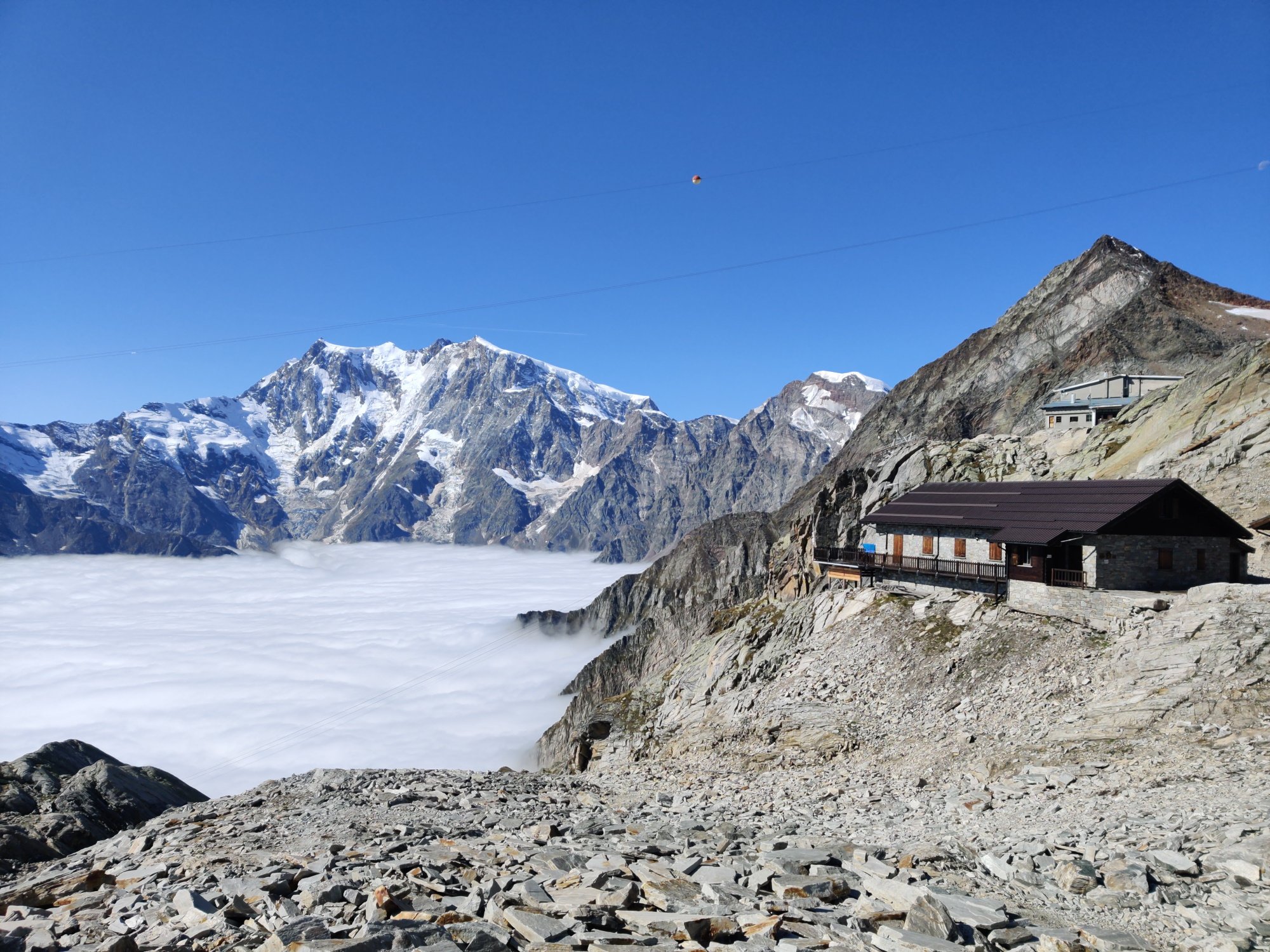
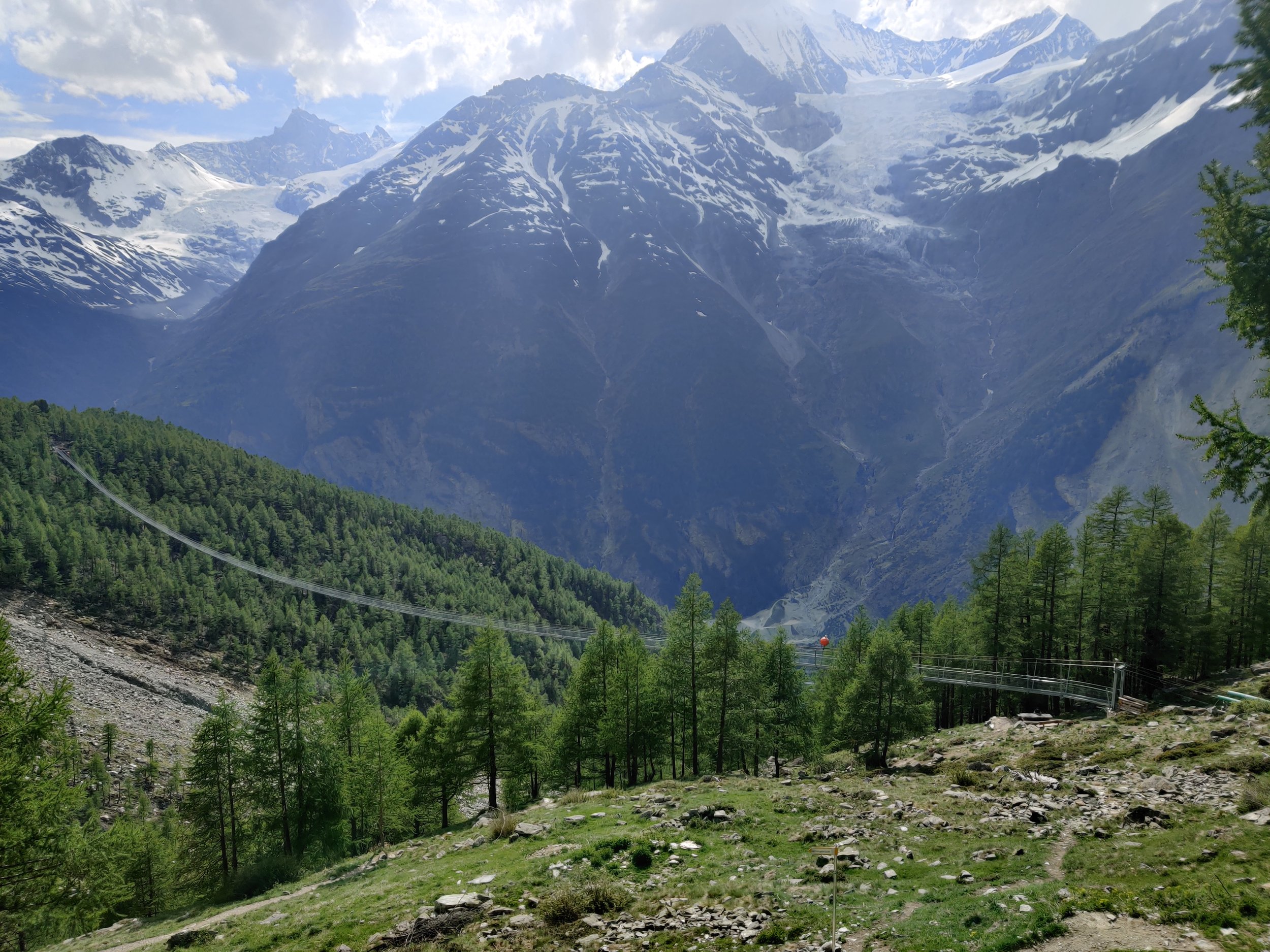
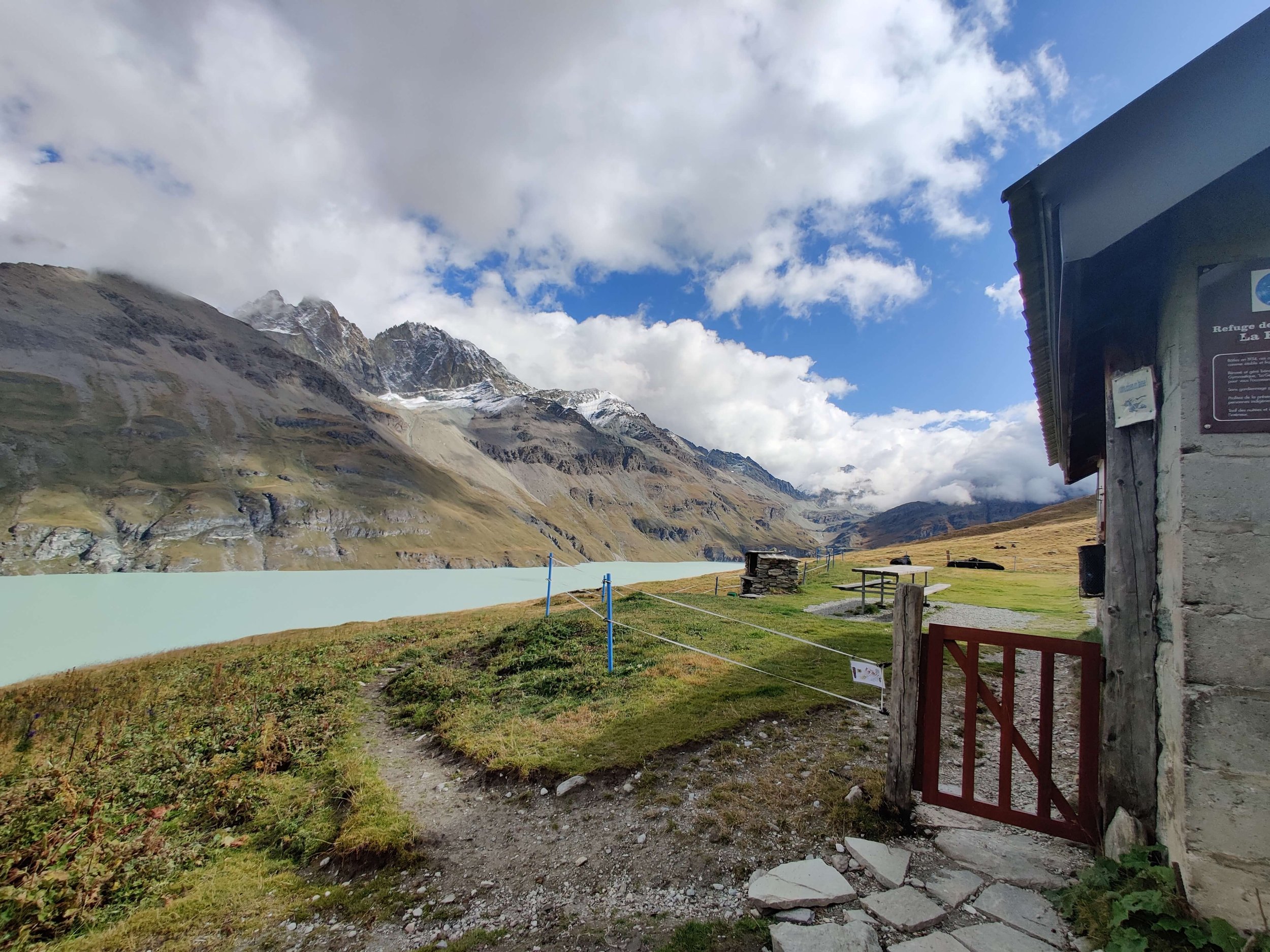
Col du Grand Saint Bernard holds particular historical significance as Napoleon crossed here with his army to surprise Austrian forces in Genoa. A famous painting (considered a propaganda masterpiece) was produced to mark the occasion and ultimate triumph of the campaign. In the painting, Napoleon is wearing a magnificent cloak on a rearing charger, when in actual fact, he crossed the pass riding a donkey, wearing a simple grey greatcoat. Hannibal is also etched into the foreground of the painting which aims to draw a comparison with other great generals and has fueled the debate as to whether Col du Grand Saint Bernard was where he crossed the Alps with his African war elephants to strike at Rome.
Napoleon crossing the Alps: Jacques-Louis David, Public domain, via Wikimedia Commons
The Pennine Alps is also home to The Great St Bernard Hospice was originally a monastic shelter founded in the Middle Ages, led by Augustinian monks. The hospitality of the monks is legendary and continues on as a hospice welcoming pilgrims and hikers, and a museum, today. Founded in 1049, the hospice became famous for its breeding and use of St Bernard dogs in rescue operations.
The Saint Bernard dog: Large size, and gentle temperament originally bred for rescue work by the hospice of the Great St Bernard Pass.
Hiking in this inspiring part of the world was where the idea for The Hiking Club was born and therefore thought there was no better location to kick off our ‘Trails of the world spotlight’. Many of you have experience hiking in the Pennine Alps so we’d invite you to share any highlights or interesting history from the area that you discovered.
Author: Brendan Jones, The Hiking Club
A pizza-making, craft beer-loving, peanut butter connoisseur that has been exploring the great outdoors since completing the Duke of Edinburgh Award in high school. He started The Hiking Club to democratise hiking and the benefits that come from spending time in nature. You can read more about Brendan and the team here.
WHO ARE WE?
The Hiking Club empowers anyone to walk the way they want in the wild with personalised self-guided hiking experiences that are easy to find, quick to plan and simple to navigate.
We believe hiking experiences have the power to transform lives. With a growing range of personalised hikes that take into account your preferences, fitness and interests, we give you everything you need to explore the legendary trails of the world!
Hiking in the Alps: 2021 Season Report
For those who could reach the Alps, COVID-19 restrictions impacted the hiking season for a second year running. At the start of the season, there was much excitement and anticipation about a COVID-19 EU Travel Certificate finally allowing tourism to resume in Europe. The silver lining of a delayed reopening for international hikers was that the conditions were not favorable for early-season hiking. There were new accumulations of snow on the high mountain trails until about the 20th of May…

